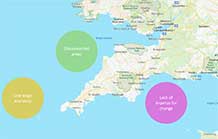Articles
Articles

On many social mobility measures the South West performs worse than any other region in the country.
Social mobility in the South West
This project aims to address the barriers to social mobility facing disadvantaged young people in the South West. On many social mobility measures the South West performs worse than any other region in the country. Yet the extent of social mobility problems in the South West has been hugely overlooked. The region’s affluence and picture postcard landscapes conceal the fact that, despite lower than average rates of deprivation, disadvantaged young people growing up locally can expect extremely poor outcomes. For example:
- On upward occupational mobility, the South West ranks third worst of 19 regions.
- 60% of disadvantaged pupils in the South West (the highest in England) did not obtain a pass in GCSE Maths and English in 2019 – a crucial qualification for accessing most jobs. This compares with 41% in Inner London.
- At the end of primary school, disadvantaged pupils nationally are on average 9.3 months behind their non-disadvantaged peers, but in Somerset they are 12.5 months behind. And the gap is widening.
- At 16-19, 4 out of the 10 local authorities with the largest attainment gaps in the country are in the South West.
- Only 18% of disadvantaged young people in the region progress to higher education – the lowest proportion of any English region.
- · Meanwhile, Devon has 4 of the top-25 below-Living-Wage local authorities (with between 33% and 41% of jobs paying below the Living Wage).
In other words, disadvantaged young people in the region face a double bind of poor mobility prospects and a poor earnings outlook.
This project will look to tackle these issues by identifying the region’s challenges and suggesting strategies and initiatives to address the challenges. Focus will be on those aged under 25 across the South West Peninsular, and three case studies will examine West Somerset, Plymouth, and Redruth and Camborne in more depth. We will propose a regional (or local) strategy to effectively address the specific challenges a region or area might be facing. And we aim to make sure the South West is a key part of national agendas and a frontrunner in trialling this regional approach.
The project is based at the University of Exeter’s Graduate School of Education which hosts the University’s Centre for Social Mobility. Initial funding is being generously provided by the Cobalt Trust. The project team comprises Lee Elliot-Major, Professor of Social Mobility; Will Harvey, Professor at the Exeter Business School, and Anne-Marie Sim, Postdoctoral Research Associate. They will be supported by an advisory board comprising Sir Steve Smith (Chair), former Vice Chancellor and Chief Executive of the University of Exeter; Stephen Dawson, Chair of the Cobalt Trust, Founder and former Chair of Impetus; Mary Curnock Cook, former Chief Executive of UCAS; and Dame Suzi Leather, former Chair of the Charity Commission and Chair of the Integrated Care System for Devon.
The team hope that the research will attract the funding and piloting of initiatives to improve social mobility in the South West. They also aim to carry out further phases of work to develop and assess regional and local strategies and initiatives.
Date: 21 June 2021
